|
|
|
Sort Order |
|
|
|
Items / Page
|
|
|
|
|
|
|
| Srl | Item |
| 1 |
ID:
188397
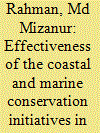

|
|
|
|
|
| Summary/Abstract |
The study attempted to identify the challenges and threats to coastal and marine conservation and assessed the effectiveness of the existing legal, policy, and institutional frameworks in this regard. This multidisciplinary research used both primary and secondary data. It was revealed that in the protected areas, both conservations and degradations go hand in hand, indicating the ineffectiveness of regulatory schemes. Ironically, many destructive activities like wetland poisoning, onslaught wildlife poaching, and clear felling of mangrove tree species threaten conservation initiatives in the coastal habitats. There is no specific law and policy which can effectively regulate marine and coastal resource management and conservation. Instead, many fragmented laws and policies created jurisdictional overlapping, followed by interest conflicts in most cases. The study recommends legal and institutional reforms to abolish jurisdictional overlapping and establish effective marine governance. The study proposed a model of an evidence-based national marine policy based on stakeholders’ perceptions.
|
|
|
|
|
|
|
|
|
|
|
|
|
|
|
|
| 2 |
ID:
188396
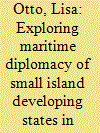

|
|
|
|
|
| Summary/Abstract |
Maritime diplomacy remains a poorly defined concept despite the fact that the maritime domain carries implications for the ways in which states relate to one another both in the past and in the contemporary era. Nonetheless, for many states, the maritime domain has come to hold increasing importance as it intersects with present environmental, economic, and security concerns. This is particularly true in Africa, where many states see the Blue Economy as their next economic frontier, presenting manifold opportunities for growth, but which are in turn threatened by transnational criminal activity, and, the universal challenge of climate change and environmental degradation. This article details the concept of maritime diplomacy and attempts to provide a typology for a deeper understanding of this form of diplomacy. It then considers the practical application of maritime diplomacy by the small island developing states in Africa, providing Mauritius and the Seychelles case studies.
|
|
|
|
|
|
|
|
|
|
|
|
|
|
|
|
| 3 |
ID:
188393


|
|
|
|
|
| Summary/Abstract |
India’s governments since 2011 have rhetorically described a new and ambitious role for the navy as a ‘net security provider’ primarily to island and littoral states of the Indian Ocean. This was primarily based on the navy’s tasks as the ‘first responder’ for maritime disasters and enhanced Maritime Domain Awareness. Yet, the navy preferred instead to be seen in a less expansive role as a ‘provider of net maritime security.’ In late 2020, the navy further adapted this role to become a ‘preferred security partner’ for the littoral and island states of the Indian Ocean. This was essentially the result of budget constraints and capacity shortfalls. But, it also wisely signalled India’s more inclusive and minilateral/multilateral approach towards maritime security cooperation in the aftermath of its border clash with China in June 2020 and China's growing presence, influence and impact in the Indian Ocean region.
|
|
|
|
|
|
|
|
|
|
|
|
|
|
|
|
| 4 |
ID:
188398
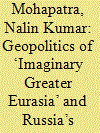

|
|
|
|
|
| Summary/Abstract |
Russia, because of its location and geopolitical proclivity, through its geopolitical doctrines of ‘Greater Eurasia’ and ‘Asia Pivot’ is interested in playing a major role in the Indo-Pacific. The growing role of the United States along with a marked increase in China’s expansionist policy in the Indo-Pacific region is also generating apprehensions for Russia. India, as a ‘pivotal player’ in the Indo-Pacific region, is also affected by the strategic developments, especially due to China's ‘imperial maneuvering’ in this geopolitical space. Being part of the Quad, and at the same time having a strategic partnership with Russia, provides India with an immense strategic opportunity. India can also strengthen its outreach to the Central Asian geopolitical space, particularly to energy-rich Kazakhstan through Russia’s Siberia and the Far East which connect with the Indo-Pacific. Russia-Ukraine war is also posing additional security challenges to Indo-Pacific.
|
|
|
|
|
|
|
|
|
|
|
|
|
|
|
|
| 5 |
ID:
188395
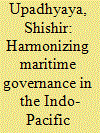

|
|
|
|
|
| Summary/Abstract |
Maritime safety and security remains an area of concern in the Indo-Pacific region, a vast integrated maritime space bound by trade and shipping connectivity. While multiple organizations have evolved over the years to address the various threats and challenges at the sub-regional level, the absence of an overarching institution that could synergize these efforts to improve wider maritime governance has hampered overall efforts. This article explains how such an ‘umbrella’ organization could be created to enhance maritime safety and security in the Indo-Pacific region.
|
|
|
|
|
|
|
|
|
|
|
|
|
|
|
|
| 6 |
ID:
188394
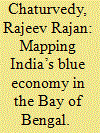

|
|
|
|
|
| Summary/Abstract |
The Bay of Bengal region is strategically and economically important for a number of reasons, with its key location, abundant natural resources, but in addition to potentials also prone to vulnerabilities, including threats to marine spaces. These variables collectively affect the policies of littoral states surrounding the Bay. The interconnected destinies of the people in the Bay region, however, demand a comprehensive approach. The concept of a “blue economy” aims to recognise and address challenges to the health of the seas while also embracing the benefits associated with them. India’s approach to the Bay and her efforts to preserve, manage, and safeguard it, are examined in this article, with focus on a cooperative approach, through regional collaboration, under the rubric of the blue economy.
|
|
|
|
|
|
|
|
|
|
|
|
|
|
|
|
| 7 |
ID:
188392
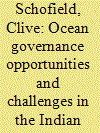

|
|
|
|
|
| Summary/Abstract |
This dedicatory section in this issue of the Journal of the Indian Ocean Region includes three papers as part of an effort to honor Commodore Professor Sam Bateman who passed away in October 2020. Before joining the academic community full-time, Sam served in the Royal Australian Navy (RAN) for four decades, commanding several ships. Sam was a scholar and a sailor, something that was illustrated by his taking on the role of the first Director General of the RAN’s Maritime Studies Program which later became the Sea Power Centre Australia. Further, in his final posting with the Navy, Sam became the founding Director of the Centre of Maritime Policy (CMP) at the University of Wollongong, the organization that became the Australian National Centre for Ocean Resources and Security (ANCORS) in 2005. Further, from 2004 to 2018, he served Senior Fellow and Advisor to the S. Rajaratnam School of Maritime Security Programme (2004–2018).
|
|
|
|
|
|
|
|
|
|
|
|
|
|
|
|
|
|
|
|
|